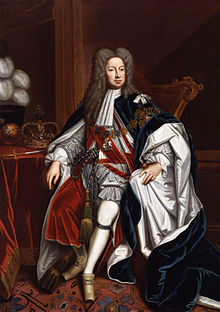King George I of Great Britain
| George I | |||||
|---|---|---|---|---|---|

George I, c. 1714. Studio of Sir Godfrey Kneller.
|
|||||
| King of Great Britain and Ireland (more...) | |||||
| Reign | 1 August 1714 – 11 June 1727 | ||||
| Coronation | 20 October 1714 | ||||
| Predecessor | Anne | ||||
| Successor | George II | ||||
| Prime Minister | Robert Walpole | ||||
| Elector of Hanover | |||||
| Reign | 23 January 1698 – 11 June 1727 | ||||
| Predecessor | Ernest Augustus | ||||
| Successor | George II | ||||
| Born |
28 May 1660 7 June 1660 (N.S.) Hanover, Brunswick-Lüneburg, Holy Roman Empire |
||||
| Died | 11 June 1727 (aged 67) 22 June 1727 (N.S.) , Osnabrück |
||||
| Burial | 4 August 1727 Leineschloss, Hanover; later Herrenhausen, Hanover |
||||
| Spouse | Sophia Dorothea of Celle | ||||
| Issue more... |
George II Sophia Dorothea, Queen in Prussia |
||||
|
|||||
| House | Hanover | ||||
| Father | Ernest Augustus, Elector of Hanover | ||||
| Mother | Sophia of the Palatinate | ||||
| Religion | Lutheran | ||||
| Signature | |||||
| Full name | |
|---|---|
| George Louis German: Georg Ludwig |
George I (George Louis; German: Georg Ludwig; 28 May 1660 – 11 June 1727) was King of Great Britain and Ireland from 1 August 1714 until his death, and ruler of the Duchy and Electorate of Brunswick-Lüneburg (Hanover) in the Holy Roman Empire from 1698.
George was born in Hanover and inherited the titles and lands of the Duchy of Brunswick-Lüneburg from his father and uncles. A succession of European wars expanded his German domains during his lifetime, and in 1708 he was ratified as prince-elector of Hanover. At the age of 54, after the death of Queen Anne of Great Britain, George ascended the British throne as the first monarch of the House of Hanover. Although over fifty Roman Catholics bore closer blood relationships to Anne, the Act of Settlement 1701 prohibited Catholics from inheriting the British throne; George was Anne's closest living Protestant relative. In reaction, Jacobites attempted to depose George and replace him with Anne's Catholic half-brother, James Francis Edward Stuart, but their attempts failed.
During George's reign, the powers of the monarchy diminished and Britain began a transition to the modern system of cabinet government led by a prime minister. Towards the end of his reign, actual political power was held by Sir Robert Walpole, now recognised as Britain's first de facto prime minister. George died of a stroke on a trip to his native Hanover, where he was buried.
...
Wikipedia
